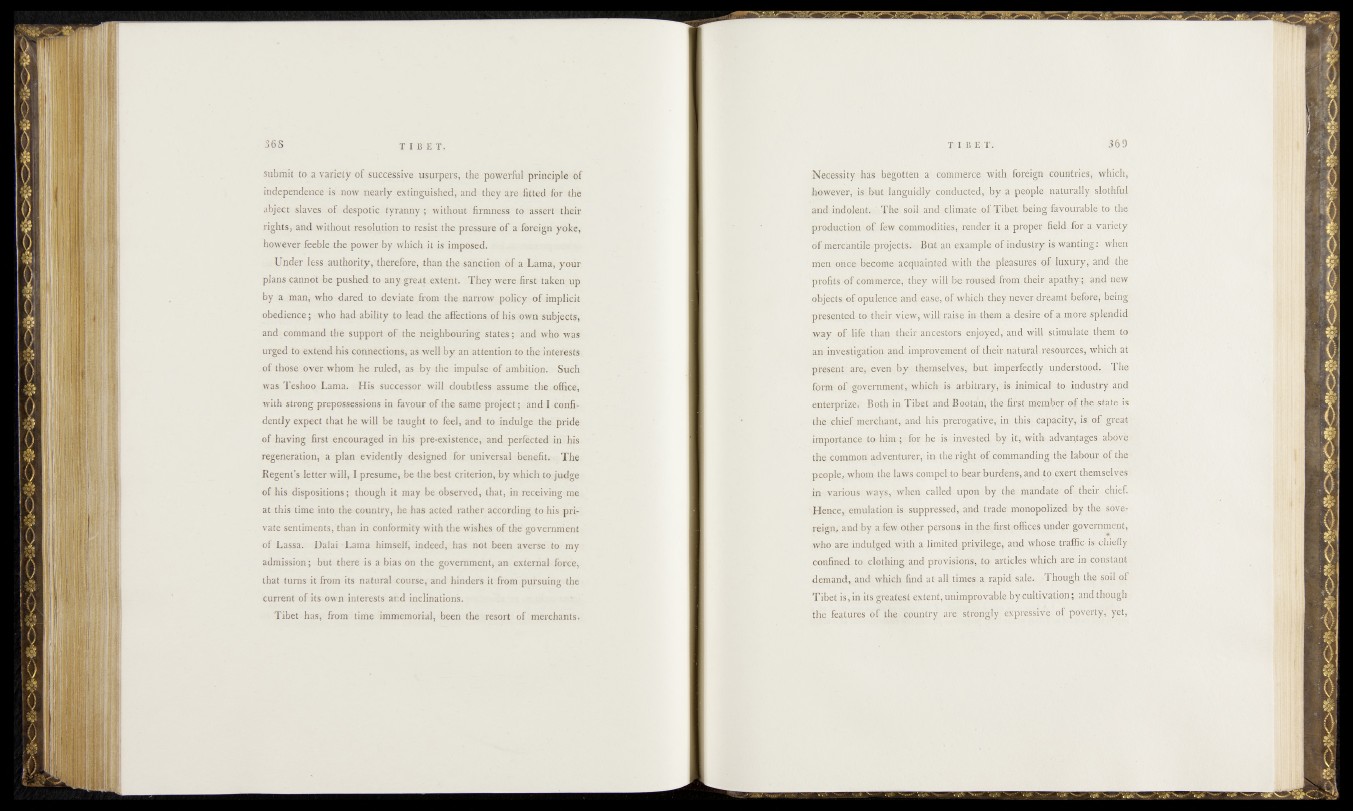
submit to-a.yariety of successive usurpers, the powerful principleof
independence is .now .nearly extinguished,, and they are-.feted for the
abject, slaves of despotic tyranny; without firmness to assert their
rights, and without resolgtigri to resist the pressure of a foreign yoke,
however feeble the power by which it is imposed.
Under less authority, therefore, than the sanction of a Lama, your
plans cannot be pushed to any greatextent* They were first taken up
by a man,- who dared Jo-deviate from the narrow pplifeyvofdihpKcit
obedience ; who had ability to lead the affections of hisrown subjects,
and command the support of the neighbouring states ; and; who was
'urged to .extend his connections, as well by an attention, to the intetost£s
of those over, whom he ruled, as by the impulse* of ambition.'; Such
was Teshoo Lama. His successor will doubtless assume the .office,
with strong prepossessions in favour of the same project;. dndl »conft.-
dently expect that he will be taught to feel, and to indulge the pride
of having first encouraged in his pre-existence,, and perfected in his
regeneration, a plan evidently designed for universal benefit, a The
Regent’s letter will, I presume, be the best criterion,-by which, to.judge
of his dispositions; though it may be observed, that, in receiving me
at this time into the country, he -has acted I rather according to his private
sentiments, than in conformity with the wishes, of the government
of Lassa. Dalai Lama himself, indeed, has not been averse to my
admission; but:there is a bias on the government* an external force,
that turns it from its natural course, and hinders it from pursuing the
current of its own interests and inclination's.
Tibet has, from time immemorial, been the resort of merchants.
Necessity hasj-bègöttgn a commerces, with, foreign couptrie% which,
however, is but languidly, condaefedvb# # ^ 3 slothful
and indolents,' The;soil. 'Tibet; heipg,]%yc^ja^e^q the
prqduGtion^fld^commoditiesftitendeij'it-.a: pr^et^jfjeld.fqrj^yajUety
df'meEc.ahtUe^projects.ifrBtfit an<;examplq-o||industtayt is wafttiög,%W:b§S
nfen«.onc'&.Uecomeifacquaintecl with .th^pJeMpKes? of,luxury/ -and .the
profits of commerce,, they wi l l b " e * t h e i r - a p a t h | y j ; / apc| new
objects-of opulence^ and-q^ig,. 0f'^f^bvlhey-Be^e§'d{;é.^fei|föfpre, being
piesentcd to their view, wiU^dise in, them; a- dcsiie of.a-uune splteuchd
Way Bh.life than.tbei§|a^^t‘®a^epj»ye|f^and will stimulatejd^c^to
an-investigation and improvement of then natural^.slices, which at
present, are,,even by themselves, but pppeiicctly understood. ,'T-he
Jbrm ofrtgovernmentf-whichï i^aT.bipjajsyVfi« inimical to- inijusfiy anti
enterprize*' Both in Tibet, and Boo tan*.’the first. n£emfee|;q| the,, state is
thé chief merchant,. and his -pre^ogati^P* iri^his^papagityv^is- of g;cei(.t
importance to him-; for he is;iny-e^t^ed, hy,it^wit;^adyan,tages ahoyjj
the common* adventurer, in the'right of,commanding the laboux.of the
people, whom the laws compel, to bear bujdens, and to exert themseiyps
in various, ways, when called, upon, .by-the mandate- ofi their chief.
Hence, emulation is suppressed, and trade; monopolized by the sover
rei«-n/ and by a few other persons ii^ti^fi^joffi^^undergyreraaa^K
who aro jndulged^di a limited privilege,
confined to clothing and provisions, to articles which arejin^QK^t^pf,
demand, and which find at-airtimes a rapid, sale;^ -Though the,spil
Tibet is, in its greatest extent, unimprovable by cultivation;' and though
the features of the country are strongly expressive of poverty, yet,